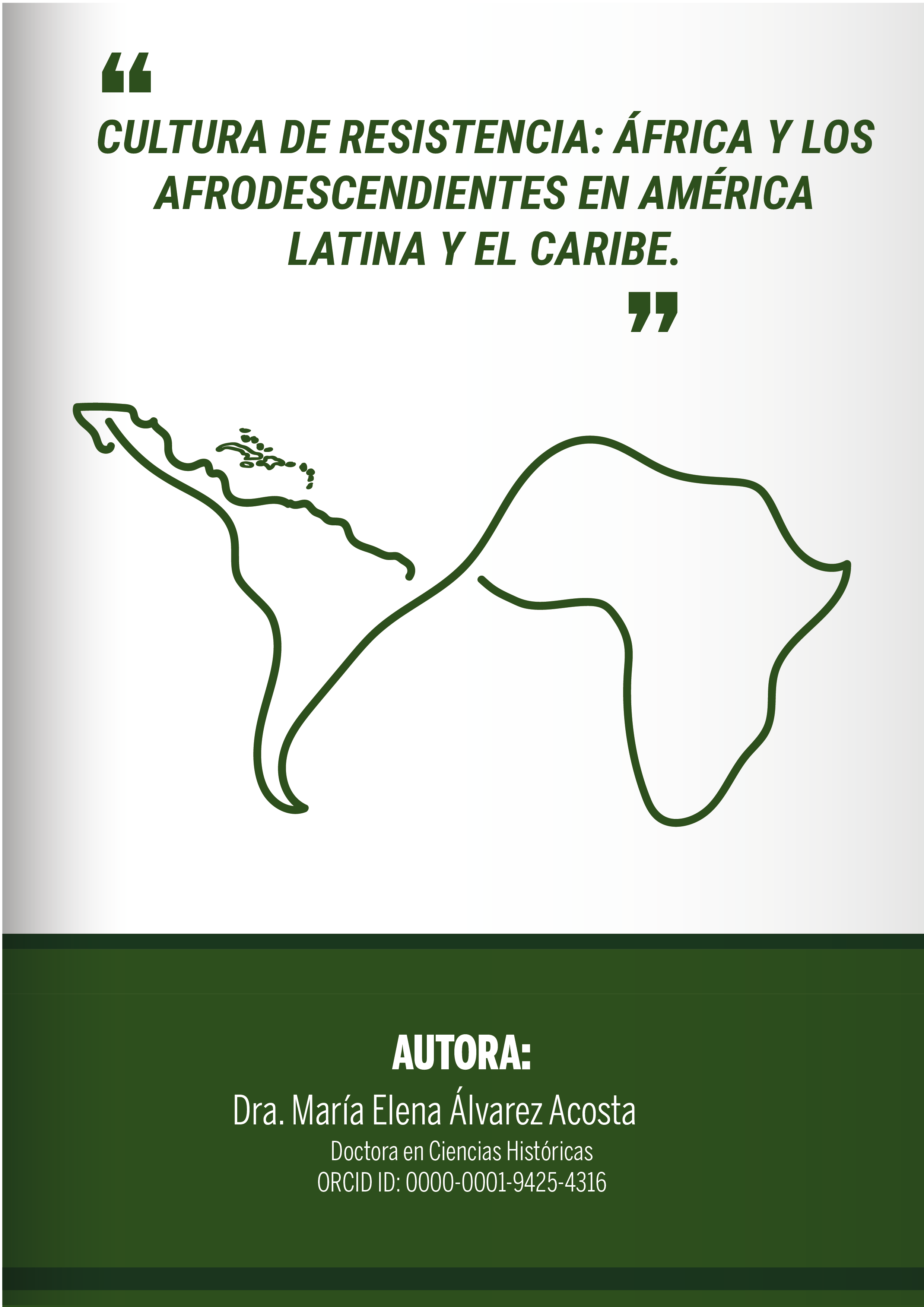Culture of resistance: Africa and Afro-descendants in Latin America and the Caribbean.
Keywords:
racism, Afro-descendants, diaspora, culture of resistance, pan-AfricanismAbstract
The development of the capitalist system had triangular trade as one of its pillars. In this context, the slave trade, an essential component of it, determined that Africans were part of the formation of American and Caribbean societies. The Eurocentric conception, with its quotas of discrimination, racism, and civilizational vision, was the basis for concealing and justifying the intrusions and dispossessions of many peoples, where Afro-descendants and Africans hold a prominent place. In that scenario, the culture of resistance manifested itself as a daily activity in the preservation of values and ways of doing things, both in Africa and in Latin America and the Caribbean. This work aims to expose some of the main manifestations of the culture of resistance of Afro-descendant communities in the Latin American and Caribbean landscape. At the same time, it explores the role of Africa towards these communities. The ultimate goal is to offer an insight into the main manifestations of the culture of resistance in the region and the interconnection between these and the originating continent. It is confirmed that, with their particularities, there have been expressions that have demonstrated transatlantic interconnection: for example, Pan-Africanism at the end of the 19th century and the Sixth Region in the 21st century.
Downloads
References
Agudelo, C. (2010). Movilizaciones afrodescendientes en América Latina. Una visión panorámica de algunas experiencias contra la exclusión y por el derecho a la identidad. Colombia Internacional, (71), 109-126. https://doi.org/10.7440/colombiaint71.2010.06
• Agudelo, C. (2019). Paradojas de la inclusión de los afrodescendientes y el giro multicultural en América Latina. Cuadernos Intercambio sobre Centroamérica y el Caribe, 16(2). https://doi.org/10.15517/c.a..v16i2.37746
• Aguirre, C. (2008). Klein, Herbert S. y Ben Vinson III. La esclavitud africana en América Latina y el Caribe. Histórica, 88(1), 212-215. https://revistas.pucp.edu.pe/index.php/historica/article/view/341/332
• Álvarez Acosta, M. E. (Coordinadora). (2011). África Subsahariana: sistema capitalista y relaciones internacionales. Colección Sur-Sur, ClACSO. https://biblioteca.clacso.edu.ar/clacso/sursur/20120312101517/africa-subsahariana.pdf
• Álvarez Acosta, M. E. (2024, del 5 al 9 de junio). La cultura de resistencia en Latinoamérica y el Caribe: manifestaciones y tendencias actuales [ponencia]. Encuentro Internacional de la Asociación de Historiadores Latinoamericanos y Caribeños (ADHILAC), Curazao.
• Ballesteros Trujillo, B. Z. (2016). Sobre el pensamiento de Frantz Fanon en piel negra, máscaras blancas y “Racismo y cultura”, entre otras reflexiones relevantes. Temas Sociales, (39), 171-188. https://www.scielo.org.bo/pdf/rts/n39/n39_a08.pdf
• Banco Mundial. (2023, mayo). Afrodescendientes en América Latina. https://www.bancomundial.org/es/region/lac/publication/afrodescendants
• Comisión Económica para América Latina y el Caribe [CEPAL] y el Fondo de Población de las Naciones Unidas [UNFPA]. (octubre de 2020). Afrodescendientes y la matriz de la desigualdad social en América Latina: retos para la inclusión. Publicación de las Naciones Unidas. https://www.cepal.org/sites/default/files/publication/files/46191/S2000226_es.pdf
• Conferencia Mundial contra el Racismo, la Discriminación Racial, la Xenofobia y las Formas Conexas de Intolerancia (2001).Declaración. https://www.un.org/es/events/pastevents/cmcr/durban_sp.pdf
• Constitutive Act of the African Union, 11 de julio de 2000. https://au.int/sites/default/files/pages/34873-file-constitutiveac_en.pdf
• Declaración de Chota. (2022, septiembre). Coalición Internacional por la defensa de los Territorios. https://www.coalicionafrodescendiente.org/declaracion-del-chota/
• García, J. Ch. (2018, 31 de agosto). Afrodescendientes: identidad y cultura de resistencia. NODAL. https://www.nodal.am/2018/08/afrodescendientes-identidady-cultura-de-resistencia-por-jesuschucho-garcia
• Hooker, J. (2013, 24 de abril). Las luchas por los derechos colectivos de los afrodescendientes en América Latina. En O. Hoffman (Ed.) Política e identidad (33-64). Centro de Estudios mexicanos y centroamericanos, 33-64. https://books.openedition.org/cemca/225
• Iniesta, F. (1986). Ejércitos e islam en la historia negro-africana. En AA.VV. El militarismo en África. IEpala.
• Organización Internacional de la Juventud para Iberoamérica [OIJ]. (s.f.). Día Internacional de la Mujer AfroLatinoamérica. Afro-Caribeña, y de la Diáspora. https://oij.org/dia-internacionalde-la-mujer-afro-latinoamerica-afrocaribena-y-de-la-diaspora/
• Organización Panamericana de la Salud. (2021, 3 de diciembre). Las personas afrodescendientes de América Latina viven en condiciones muy desiguales que repercuten en su salud y bienestar, según un estudio de la OPS. https://www.paho.org/es/noticias/3-12-2021-personasafrodescendientes-america-latinaviven-condiciones-muy-desigualesque#:~:text=Washington%2C%20D.C.%203%20de%20diciembre,la%20Organiz
• UNESCO. (2024). Las rutas de las personas esclavizadas. Romper el silencio en torno a la historia de la esclavitud. https://www.
unesco.org/es/routes-enslaved-peoples
• Unión Africana (2011). Report of the Technical Experts Meeting on the African Diaspora (TCEM), Pretoria, Sudáfrica: Unión Africana. https://au.int/sites/default/files/documents/30969-doc-report_of_the_technical_experts_meeting_on_the_african_diaspora-english.pdf
• Wilson Thatum, D. (2009, 5 de diciembre). ¿Dónde estamos las y los afrodescendientes en los censos de América Latina y el Caribe? http://www.mujeresafro.org/idonde-estamos-las-ylos-afrodescendientes-en-los-censos-deamerica-latina-y-el-caribe/

Downloads
Published
How to Cite
Issue
Section
License
Copyright (c) 2025 Ad Hoc

This work is licensed under a Creative Commons Attribution-NonCommercial 4.0 International License.











